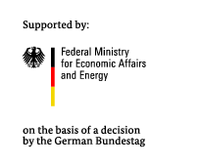DecEnSys – Decomposition of energy systems for modeling decentralized power supply systems
| Partners | Research Unit: Applied Geometry and Discrete Mathematics (Prof. Gritzmann) |
| Funding | BMWi |
| Duration | May 2016 to April 2019 |
| Contact | M.Sc. Magdalena Dorfner |
Overview of the research project DecEnSys
The number of renewable energy sources integrated into the German power system is increasing, which leads to changes in the structure of the system. The centralized and hierarchical system is becoming more and more decentralized. Mutual dependencies grow between energy sources, network regions and system levels which leads to additional uncertainty. On the other hand, the energy system is analyzed and evaluated mostly on separate system levels (from municipalities to entire nations) with specifically adapted modelling techniques on different levels of detail. The changes mentioned require a more integrated perspective on the energy system that connects these different approaches.
The project DecEnSys aims to further develop methods for modelling and optimization of energy systems to couple the various system levels in a reliable way. This will serve to represent the mentioned properties of the future energy system more appropriately. The project is based on modern methods of mathematical optimization and aims to develop these further. Decomposition methods, which will be adapted explicitly to problems of energy system analysis, allow a more detailed representation of the decentralized future energy system including the existing uncertainties. Using this representation, reliable demand analyses will be carried out. Furthermore, detailed models for municipalities and larger regions can be incorporated using suitable interfaces.
Based on the developed methods, economically optimal expansion and development plans for power plant, grid and storage infrastructure will be computed. For the computation, relevant uncertain factors as well as existing policies on all system levels can be taken into account. The results will be published and the improved methods will be implemented and made accessible under an open-source license to simplify public access.

Project outcome
as a result of the project DecEnSys, the optimization framework of the chair ENS "urbs" has been further developed with the decomposition methods added. The repository of urbs with the implemented methods can be accessed under the following link:
https://github.com/tum-ens/urbs/tree/decensys
A detailed documentation and tutorial for using the decomposition methods can be found under the following link:
https://urbs.readthedocs.io/en/decensys/decomposition.html
A jupyter notebook, which has been used to process the input and output data within the scope of DecEnSys project, can be found here:
https://github.com/tum-ens/notebooks
Publications
Journal papers
- M. Dorfner und P. Kuhn. „Datentransparenz in der Energiesystemoptimierung - Beispiel Bayern“. In: 12. Fachtagung - Optimierung in der Energiewirtschaft. Bd. 2303. VDI Berichte 2303. Nov. 2017, S. 91–96
- P. Gögler u. a. „Hybrid Robust/Stochastic Unit Commitment With Iterative Partitions of the Continuous Uncertainty Set“. In: Frontiers in Energy Research 6 (2018)
- P. Stursberg. „Improved Methods for Electricity Network Optimization“. Diss. Technische Universität München, in Vorbereitung
- R. Brandenberg und P. Stursberg. „Cut Selection For Benders Decomposition“. In: (2019)
- P. Gritzmann u. a. „Mathematical Optimization for Power System Analysis“. In: Renewable and Sustainable Energy Reviews (in Vorbereitung).
Conference papers
- 21st Workshop on Future Research in Combinatorial Optimization 2017: P. Stursberg. „Improved Benders Cut Selection with application to Energy System Optimization“, Vortrag, Trier
- MSE Kolloquium 2017: P. Stursberg, M. Dorfner. „DecEnSys“, Posterpräsentation, München
- Forschungsnetzwerk 2018: P. Stursberg, M. Dorfner. „DecEnSys“, Posterpräsentation, Berlin
- International Symposium on Mathematical Programming 2018: P. Strsberg. „Improved Cut Selection for Benders Decomposition“, Vortrag, Bordeaux
- Sustainable Development of Energy, Water and Environment Systems Conference 2018: M. Dorfner, L. Odersky, P. Kuhn. „Open energy system modeling with urbs – Example Germany“, Vortrag, Palermo
- Energy Modeling Platform for Europe 2019; M. Stüber, L. Odersky, P. Stursberg. „Uncertainty modeling with the open source framework urbs“, Posterpräsentation, Brüssel